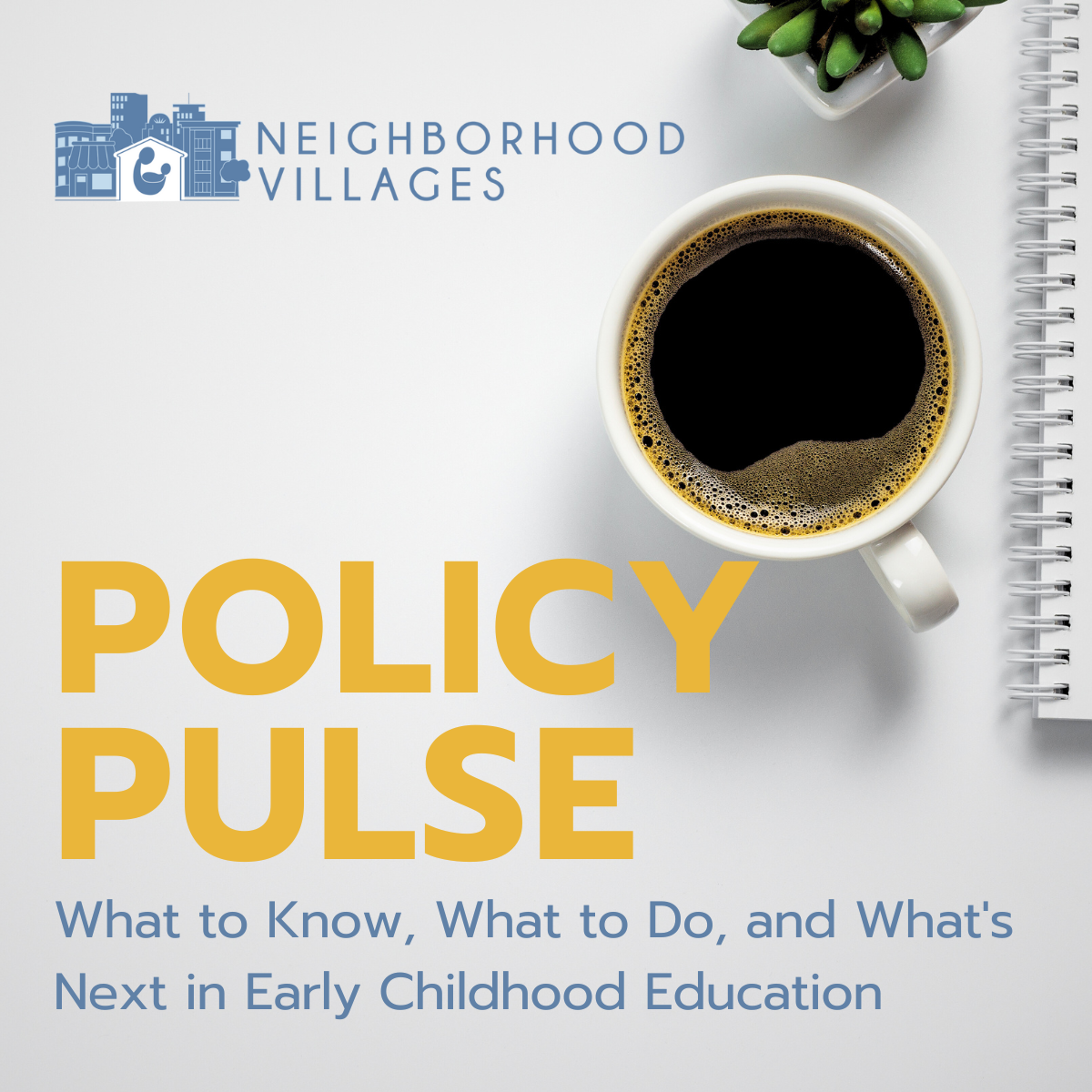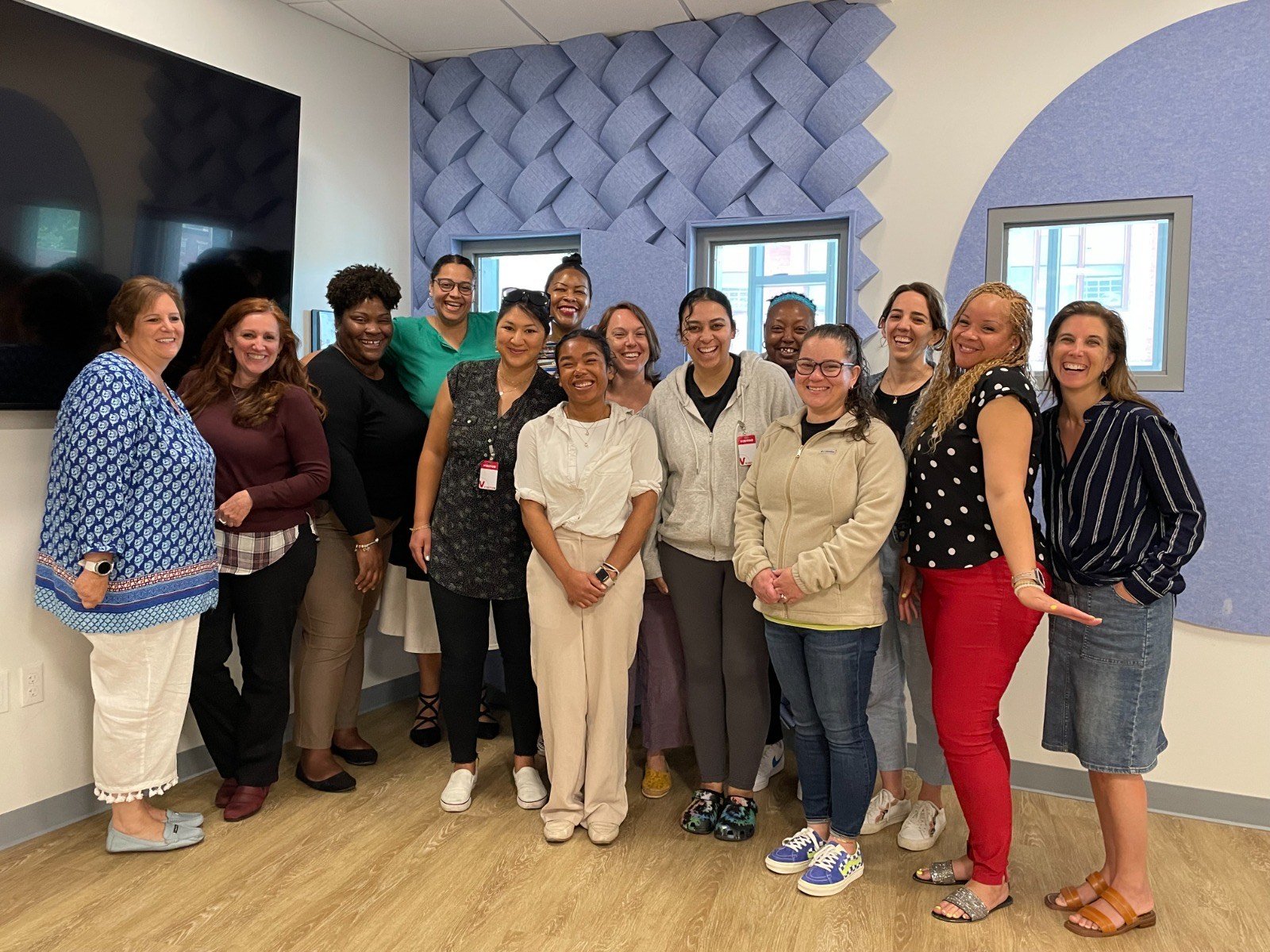
The Desktop
From the Desk of Neighborhood Villages

Policy Pulse #2
Welcome to issue two of Neighborhood Villages’ Policy Pulse. In this issue we dive into the most recent Department of Early Education and Care (EEC) Board meeting, share more details on what’s on the table in this year’s Massachusetts state budget, and share more about Governor Maura Healey’s Interagency Early Education and Care Task Force.

One Educator’s Journey From Child Care Provider to College Graduate
Bortolotto’s journey from a family child care provider to a college graduate is a testament to the power of education and the importance of having support systems in place to achieve professional growth.

Introducing: The Policy Pulse
We are excited to introduce Neighborhood Villages’ first Policy Pulse - a guide to all things early education and care. In each issue, you will find an overview of what’s happening with Massachusetts and national child care policy and information on what you can do to take action and join the movement for a transformed early education and care system.

Launching Our New Play-Based Toddler Curriculum, Co-Created with Educators
At Neighborhood Villages, we are committed to addressing inequity in the early childhood education field—and we know that begins with focusing on the needs of our youngest learners and their dedicated educators.

RECAP of the March EEC Board Meeting: Commonwealth Cares for Children (C3) and Child Care Financial Assistance Programs
At Neighborhood Villages, we prioritize keeping up with the policy landscape in the early education and care field, both across the country and in Massachusetts. That includes tuning-in to the monthly meetings of the Massachusetts Board of Early Education and Care (“EEC Board”), to stay apprised of updates and to identify opportunities for how we can work with government and other stakeholders to improve our early education and care system.

RECAP of the February EEC Board Meeting: Governor’s Budget and the Commonwealth Preschool Partnership Initiative
At Neighborhood Villages, we prioritize keeping up with the policy landscape in the early education and care field, both across the country and in Massachusetts. That includes tuning-in to the monthly meetings of the Massachusetts Board of Early Education and Care (“EEC Board”), to stay apprised of updates and to identify opportunities for how we can work with government and other stakeholders to improve our early education and care system.

Breaking down the costs of high-quality early education in Massachusetts
Our new report, High-Quality Early Childhood Education: Opening the Books on its True Costs, unpacks what goes into offering high-quality early learning — from teacher wages, to core operating expenses, to wraparound services for families.

Black History Month Reflections on Child Care and Education
During Black History Month, we celebrate the achievements of the Black women and men that came before us. However, we can’t properly appreciate the weight of those triumphs without acknowledging the exploitation and marginalization of Black people that has served as a backdrop in our country’s history.

RECAP of the January EEC Board Meeting: Consolidated Reimbursement Rates and Contract Procurement
At Neighborhood Villages, we prioritize keeping up with the policy landscape in the early education and care field, both across the country and in Massachusetts. That includes tuning-in to the monthly meetings of the Massachusetts Board of Early Education and Care (“EEC Board”), to stay apprised of updates and to identify opportunities for how we can work with government and other stakeholders to improve our early education and care system.

Keys to selecting great children’s literature for the ECE classroom
Neighborhood Villages’s Toddler Curriculum is committed to the principles of developmentally appropriate practice, anti-bias education and social-emotional learning. One of the keys to bringing these important values together is thoughtful and intentional curation of children’s books for the toddler classroom.

What is anti-bias education?
Dedicated educators work towards a more equitable future by practicing anti-bias education daily. By intentionally incorporating social-emotional skills into the curriculum, they provide students with a thoughtful and personalized education that recognizes and celebrates their unique identities.

Recent Improvements to Massachusetts Child Care Financial Assistance Program are Helping More Families Access Care
This fall, the Massachusetts Department of Early Education and Care (EEC) and the state legislature made significant strides in enhancing the Commonwealth’s Child Care Financial Assistance (CCFA) program, which provides public financial assistance to eligible low-income families seeking to enroll their children in care. These improvements will help to streamline eligibility and enrollment processes, improve user-friendliness, and ensure that all low-income and vulnerable families in Massachusetts have access to quality child care.

Toddler Curriculum: Guiding Intentional Family Engagement
The Neighborhood Villages toddler curriculum project is rooted in strengths-based practice and is founded on the belief that caregivers are the true experts on children’s development and needs. As a result, family engagement is an integral piece of the work. As children’s first teachers and keepers of their unique histories, traditions, and cultures, families are engaged in a manner that aims to be thoughtful and culturally sustaining.

Curriculum: Support for Educators, flexibility for children
With the support of the Lego Foundation, Neighborhood Villages is trying to change what an early childhood curriculum looks like. We deeply believe in play for its own sake, child-directed learning, and prioritizing toddlers' social-emotional development.

A co-created community resource: Elevating educator voices
"How do we create a curriculum that authentically serves the audience it is created for and where do we start?"
That was the question and puzzle that Neighborhood Villages sought to solve when creating an innovative, play-centered curriculum for toddlers.

How Neighborhood Villages is helping children and families through the migrant crisis
The Commonwealth of Massachusetts is facing an unprecedented crisis in its shelter system, which, for the first time, has reached its capacity. This population includes an estimated 5,000 under-school-age children (0-5). They are in need of nurturing, trauma-informed learning environments where they can play, seek comfort, and be in community with children and nurturing caregivers.

Neighborhood Villages rallies with partners to fix child care at the Massachusetts State House
Today, Neighborhood Villages came together with parents, providers, educators, and partner organizations to support vital reforms in child care and early education at the Massachusetts State House.

Where to start? Looking to the Reggio-Emilia approach to meet the needs of toddlers
Neighborhood Villages, in partnership with the Lego Foundation and the Boston Public Schools, has created an innovative, first-of-its-kind curriculum resource explicitly designed for the developmental needs of toddlers. Being Reggio-inspired, it is driven by documentation and children’s interests, centering play in every interaction and learning experience in which toddlers engage.

ICYMI: Co-Founder, Lauren Kennedy, Testifies at the Joint Committee on Education Informational Hearing
Early education and care play a critical role in shaping a child’s future and supporting working families. However, in Massachusetts, and across the country, the child care system has faced numerous challenges and shortcomings, leaving families struggling to access affordable, high-quality care for their children.

Our work to address the children’s mental health crisis
Right now, we are in the midst of a mental health crisis that is affecting even our youngest children. Made worse by the pandemic, long delayed or absent mental health services have resulted in an urgent need for mental health supports in early childhood education (ECE) settings. That’s why here at Neighborhood Villages, we’ve prioritized creating an innovative, scalable model for how centralized and multi-layered mental health supports can be delivered in ECE settings in Massachusetts.
